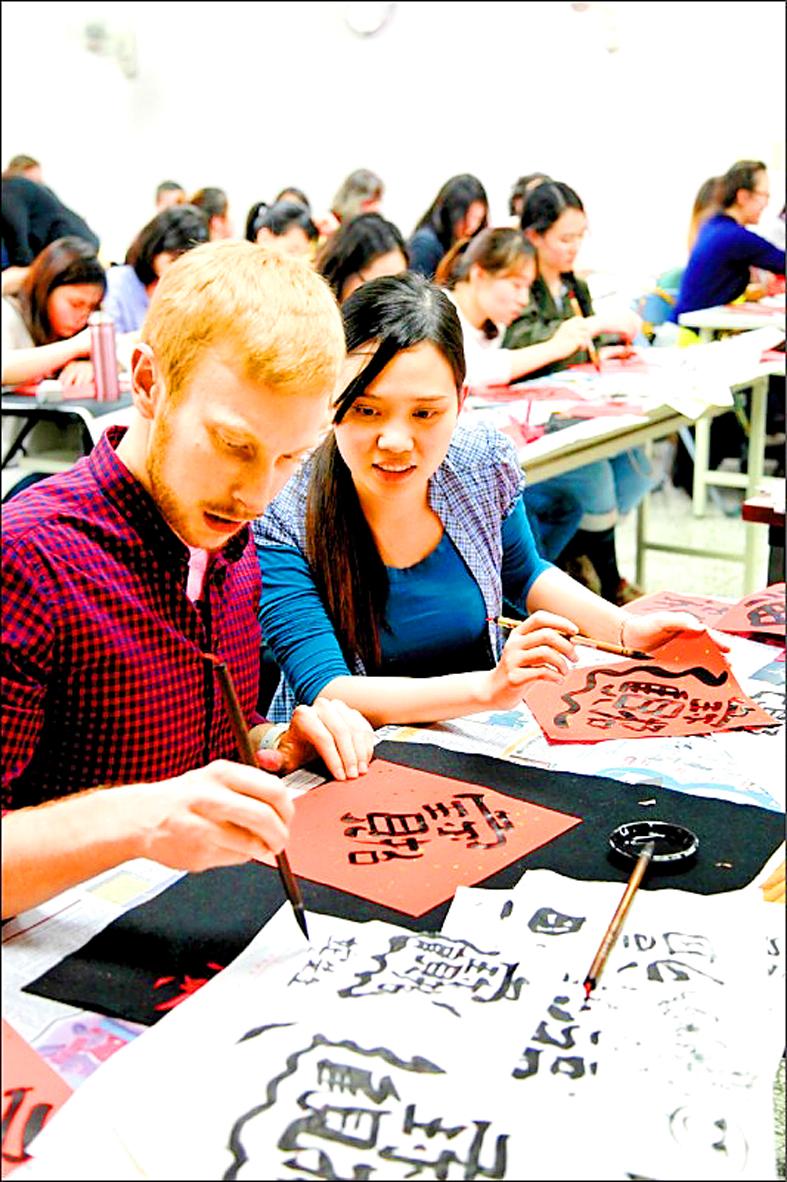The Ministry of Education plans to upgrade the Test of Chinese as a Foreign Language (TOCFL) by reviewing and improving the database of test questions before launching a new version — TOCFL 2.0 — in 2023.
The TOCFL is a proficiency test for non-native speakers of Chinese that categorizes language proficiency into four bands and eight levels, the ministry said yesterday.
The levels were based on those used in the Common European Framework of Reference for Languages and those used by the American Council on the Teaching of Foreign Languages, the ministry said.

Photo courtesy of National Taiwan Normal University
The ministry said that from 2013 to last year, it sought to make Chinese-language education a major export of Taiwan.
The National Academy for Educational Research developed the Taiwan Benchmarks for the Chinese Language, which lay out the Chinese characters, words and grammar points to be mastered at each proficiency level, while the ministry developed a portal that integrated the benchmarks with the Corpus of Contemporary Taiwanese Mandarin, it said.
Building on the corpus, the government-funded Steering Committee for the Test of Proficiency-Huayu is to review the existing database of test questions and improve their quality, it said.
The new version would be learner-centered and expand on the first version’s computerized adaptive testing, immediately assessing test takers and offering them questions that pinpoint their abilities, it added.
The ministry said that it would continue to seek official recognition for the test in other countries, lobby for its use as proof of Chinese-language proficiency for new employment, increase the number of overseas TOCFL centers and encourage test takers who achieve a certain level of proficiency to study in Taiwan.
The ministry’s promotion of Chinese-language education partly relies on Taiwanese teachers who teach Chinese in other countries.
Hung I-chiao (洪亦喬), 31, teaches Chinese at Pennsylvania State University in the US.
In August, Hung — who was working on a doctorate in the Department of Chinese as a Second Language at National Taiwan Normal University, which has a cooperative program with Penn State — volunteered to teach Chinese in the US.
Regular US students and overseas Chinese take Chinese-language classes for at least five hours per week over three semesters, she said.
Many students in the US begin learning Chinese because of movies or comedies, but another strong motivation is career development, as many students have noticed how many Chinese speakers there are around the world, Hung added.
She said that she also promotes the TOCFL, and that many Penn State students have registered for the test this semester.

Taiwan’s Liu Ming-i, right, who also goes by the name Ray Liu, poses with a Chinese Taipei flag after winning the gold medal in the men’s physique 170cm competition at the International Fitness and Bodybuilding Federation Asian Championship in Ajman, United Arab Emirates, yesterday.

Costa Rica sent a group of intelligence officials to Taiwan for a short-term training program, the first time the Central American country has done so since the countries ended official diplomatic relations in 2007, a Costa Rican media outlet reported last week. Five officials from the Costa Rican Directorate of Intelligence and Security last month spent 23 days in Taipei undergoing a series of training sessions focused on national security, La Nacion reported on Friday, quoting unnamed sources. The Costa Rican government has not confirmed the report. The Chinese embassy in Costa Rica protested the news, saying in a statement issued the same

A year-long renovation of Taipei’s Bangka Park (艋舺公園) began yesterday, as city workers fenced off the site and cleared out belongings left by homeless residents who had been living there. Despite protests from displaced residents, a city official defended the government’s relocation efforts, saying transitional housing has been offered. The renovation of the park in Taipei’s Wanhua District (萬華), near Longshan Temple (龍山寺), began at 9am yesterday, as about 20 homeless people packed their belongings and left after being asked to move by city personnel. Among them was a 90-year-old woman surnamed Wang (王), who last week said that she had no plans

TO BE APPEALED: The environment ministry said coal reduction goals had to be reached within two months, which was against the principle of legitimate expectation The Taipei High Administrative Court on Thursday ruled in favor of the Taichung Environmental Protection Bureau in its administrative litigation against the Ministry of Environment for the rescission of a NT$18 million fine (US$609,570) imposed by the bureau on the Taichung Power Plant in 2019 for alleged excess coal power generation. The bureau in November 2019 revised what it said was a “slip of the pen” in the text of the operating permit granted to the plant — which is run by Taiwan Power Co (Taipower) — in October 2017. The permit originally read: “reduce coal use by 40 percent from Jan.